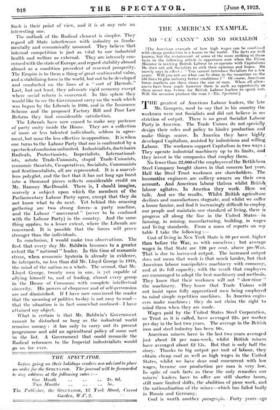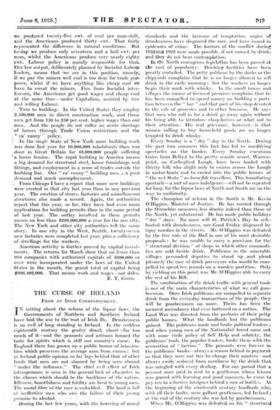THE AMERICAN EXAMPLE.
NO " CA' CANNY " AND NO SOCIALISM [The American example of how high wages can be combined with cheap production is a lesson to the world. The facts are Well known, but the restatement of some of the more striking of these facts in the following article is opportune now when the Prime Minister is inviting British Labour to co-operate with Capitalism:: He does not ask Socialists to sink their opinions and hopes. Hci merely says in effect : "You cannot introduce Socialism for a few years. Will you not see what can be done in the meantime on the old lines to give industry better conditions ? " Of course, American home markets are three times the size of ours. When all allow- ances have been made however there is such an opportunity as there never was before for British Labour leaders to speak out: Will the occasion produce the man 1—En. Spectator.] THE greatest of American Labour leaders, the late Mr. Gompers, used to say that in his country the workmen were not Socialists and did not believe in re.; striction of output. There is no great Socialist Labour Party in America. The Trade Unions do not specially, design their rules and policy to hinder production and make things scarce. In America they have highly_ developed Capitalism, assisted by industrious and willing Labour. The workmen support Capitalism in two ways :. They operate industrial machinery up to its limits, and they invest in the companies that employ them.
No fewer than 22,000 of the employees of the Bethlehem. Steel Company bought shares in that concern last year. Half the Steel Trust workmen are shareholders. The locomotive engineers are colliery owners on their own account. And American labour thrives whilst British' labour agitates. In America they work. ,Here we" talk. And see the results. Whilst British agriculture declines and manufactures stagnate, and whilst we suffer a house famine, and find it increasingly difficult to employ, our people and maintain our standard of living, there is progress all along the line in the United States—in farming, in mining, manufacturing, building, in wages and living standards. From a mass of reports on my table I take the following :- Cost of living in New York State is 80 per cent. higher than before the War, as with ourselves ; but average wages hi that State are 120 per cent. above pre-War. That is due to increased output. The increased output does not mean that work is that much harder, but that American labour manipulates machinery with economy, and at its full capacity, with the result that employers are encouraged to adopt the best machinery and methods. They know that their workmen will not " slow-time " the machinery. They know that Trade Unions will not insist upon .fully apprenticed men being employed to mind simple repetition machines. In America engin- eers make machines ; they do not claim the right to mind them when they are made.
Wages paid by the United States Steel Corporation, or Trust as it is called, have averaged 22s. per worker per day in the last two years. The average in the British iron and steel industry has been 10s.
American miners have in the last two years averaged just about £8 per man-week, whilst British ininers have averaged about £2 15s. _ But- that is only half the story. Thanks to big output per unit of labour, they obtain cheap coal as well as high wages in the United States, whilst we have dear coal concurrent -With low wages, becauSe our .production per . man is very. low. In spite of Such facts as these the only remedies our miners' leaders have to offer are still shorter- hours, still more limited shifts,-the abolition of piece work, and- the nationalization of the mines—which has failed badly in Russia and Germany.
Coal is worth another paragraph. • Forty years ago we produced twenty-five cwt. of coal per man-shift, and the Americans produced thirty cwt. That fairly represented the difference in natural conditions. But to-day we produce only seventeen and a half cwt. per man, whilst the Americans produce very nearly eighty `cwt. Labour policy is mainly responsible for that. Our low output, deliberately planned by Socialist Labour .leaders, means that we are in this position, namely, if we pay the miners well coal is too dear for trade pur- poses, whilst if we have anything like cheap coal we have to sweat the miners. Free from Socialist inter- ference, the Americans get good wages and cheap coal at the same time—under Capitalism, assisted by free and willing Labour.
Turn to building. In the United States they employ 2,500,000 men in direct construction work, and those men get from 150 to 250 per cent. higher wages than our men. And the people do not suffer an acute shortage of houses through Trade Union restrictions and the " ea' canny " policy.
In the single State of New York more building work was done last year for 10,000,000 inhabitants than was done in Great Britain for 43,000,000 people suffering a house famine. The rapid building in America means a big demand for structural steel, house furnishings and • fittings, and employment in a score of trades outside the building line. Our " ca' canny " building a poor demand and much unemployment.
From Chicago I have a report that more new buildings were erected in that city last year than in any previous year. The erection of stores, factories and miscellaneous structures also made a record. Again, the authorities report that this year, so far, they have had even more applications for building permits than in the same period of last year. The outlay involved in these permits means no less than $289,000,000 a year for the one city. The New York and other city authorities tell the same story. In one city in the West, Seattle, twenty-seven new factories were completed last year, plus a sufficiency of dwellings for the workers.
American activity is further proved. by capital invest- ' ments. The returns for March show that no fewer than 916 companies with authorized capitals of $100,000 or over were incorporated under the laws of the United States in the month, the grand total of capital being $806,402,000. That means work and wages—not doles.
E. T. GOOD.















































 Previous page
Previous page